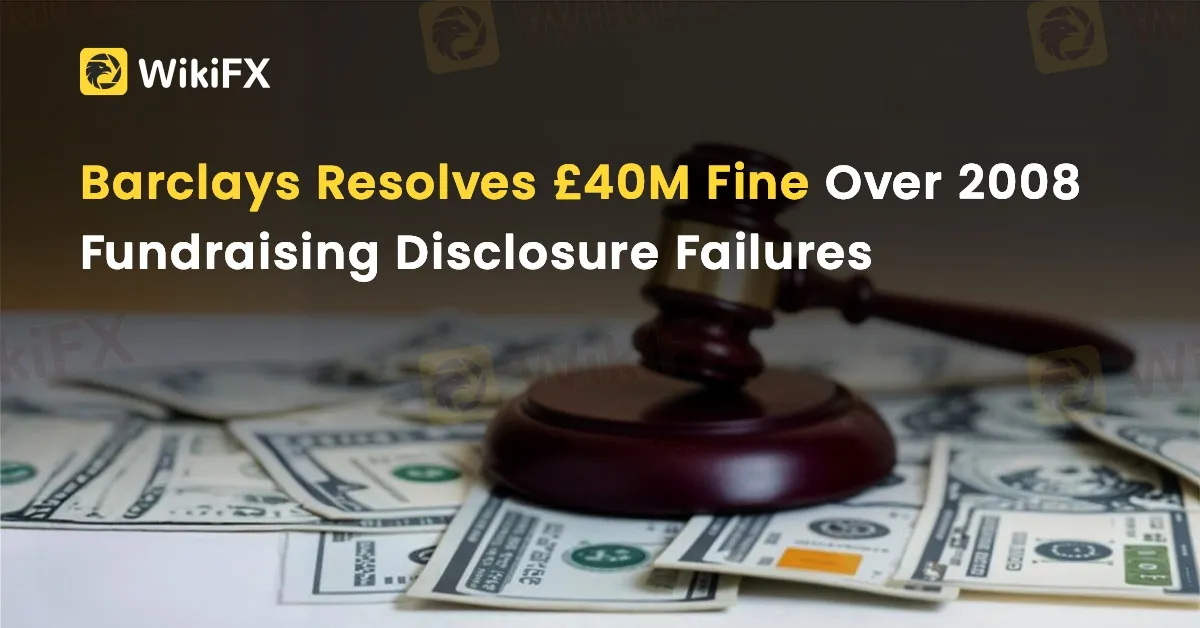简体中文
繁體中文
English
Pусский
日本語
ภาษาไทย
Tiếng Việt
Bahasa Indonesia
Español
हिन्दी
Filippiiniläinen
Français
Deutsch
Português
Türkçe
한국어
العربية
Barclays Resolves £40M Fine Over 2008 Fundraising Disclosure Failures
Abstract:Barclays has reached a settlement with the UK’s Financial Conduct Authority (FCA), agreeing to pay a £40 million fine for failing to adequately disclose arrangements with Qatari investors during its critical fundraising efforts amidst the 2008 financial crisis.

Barclays has reached a settlement with the UKs Financial Conduct Authority (FCA), agreeing to pay a £40 million fine for failing to adequately disclose arrangements with Qatari investors during its critical fundraising efforts amidst the 2008 financial crisis. This agreement marks the conclusion of a protracted regulatory investigation that began in 2013.
The case revolved around undisclosed payments totalling £322 million made by Barclays to Qatari entities through two advisory agreements. These payments were directly linked to Qatari participation in the banks June and October 2008 capital raisings and effectively increased the costs associated with their involvement. The FCA highlighted that this lack of transparency deprived investors of crucial information regarding these financial arrangements.
Regulators initially proposed a £50 million penalty, but the fine was reduced after Barclays withdrew its appeal to the Upper Tribunal. The FCAs enforcement and market oversight joint executive director, Steve Smart, emphasised the gravity of the misconduct, noting its impact on investors who were not provided with all relevant details at the time. However, he acknowledged that the events occurred 16 years ago and that Barclays has since undergone significant organisational changes to improve its practices.

This regulatory resolution comes on the heels of the collapse of a separate criminal case brought by the UKs Serious Fraud Office (SFO) against Barclays and several former executives. The SFO had conducted a five-year investigation into the roles of former Chief Executive John Varley, ex-Middle East investment banking chairman Roger Jenkins, and others. However, the charges did not result in convictions.
In its official statement, Barclays confirmed that it had agreed with the FCA to withdraw its appeals against the regulator‘s findings. The bank reiterated that none of its current board members or senior management were involved in the incidents outlined in the FCA’s notices. The statement also highlighted the substantial improvements made to the banks systems and controls in the years since the 2008 fundraising efforts.
Barclays noted that while it does not accept the FCAs findings, it has chosen to conclude the matter to prioritise the interests of the bank, its shareholders, and other stakeholders. The bank had already accounted for the financial penalty in 2022, ensuring no material financial impact on its operations.
The Barclays settlement underscores the FCA‘s ongoing commitment to addressing corporate misconduct, even years after the events. It also draws comparisons to other recent regulatory actions. Earlier this year, Metro Bank faced a £16.7 million fine for significant anti-money laundering failures that left over £51 billion in transactions insufficiently monitored. Similarly, fines imposed on Starling Bank and Citigroup in 2024 highlight the FCA’s stringent approach to ensuring financial institutions uphold their regulatory obligations.

Disclaimer:
The views in this article only represent the author's personal views, and do not constitute investment advice on this platform. This platform does not guarantee the accuracy, completeness and timeliness of the information in the article, and will not be liable for any loss caused by the use of or reliance on the information in the article.
Read more

Top 6 Shocking Truths Behind Pocket Option – Avoid this Trap
Before You Invest, Read This Important Article About Pocket Option. Protect Your Money from Scam! This article exposes 6 hidden truths about the broker that you need to know before making any investment.

Investors Call Growline a FRAUD Broker - Check Out Their Comments
Dreamt of massive returns on your forex investments through Growline but didn’t receive profit withdrawals? You are not alone! In this article, you will get to know about the problems faced by its investors. Read out their comments and share your reviews on our platform. We will highlight your issue.

Exposing Profit Trade: Profit Only Exists in Its Name, Not During Trade
If there was ever a forex scammer to be alert of, Profit Trade emerges as the first one. The Bulgaria-based forex broker has been annoying investors by denying their withdrawal requests, suspending their account without any reason, and unfulfilled promises.

Think Twice Before Choosing UC Markets –Know the Risks
Forex trading has become increasingly complex and risky, especially for newcomers. While the foreign exchange market still offers legitimate opportunities for traders and investors, but investment scams have now become common. Fake brokers are widespread, and spotting them can be extremely difficult . The only way to safeguard your capital is to stay informed and alert. In this article, we’ll break down the red flags of UCMarkets and explain why you should avoid it .
WikiFX Broker
Latest News
CNBC Daily Open: The silver lining of positive earnings could be too blinding
Brexit made businesses abandon the UK. Trump's hefty EU tariffs could bring them back
CNBC Daily Open: Solid earnings beats might mask tariff volatility these two weeks
Mastering Deriv Trading: Strategies and Insights for Successful Deriv Traders
Jeep-maker Stellantis expects first-half net loss of $2.7 billion as tariffs bite
U.S. doubles down on Aug. 1 tariffs deadline as EU battles for a deal
Buffett and Thorp’s Secret Options Strategies
Trading Market Profile: A Clear and Practical Guide
CNBC Daily Open: Investors dismiss Trump administration's beef with the Fed — S&P hits new high
Sharing Trading Mistakes and Growth
Currency Calculator


